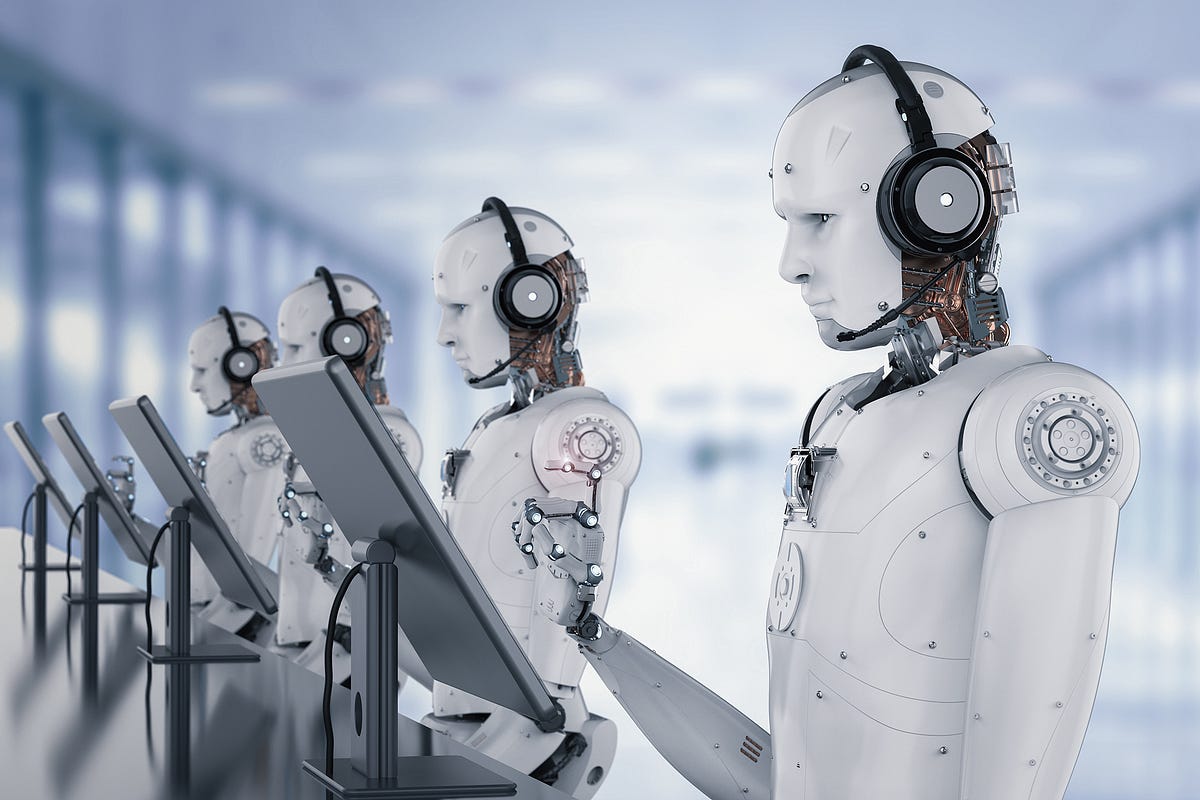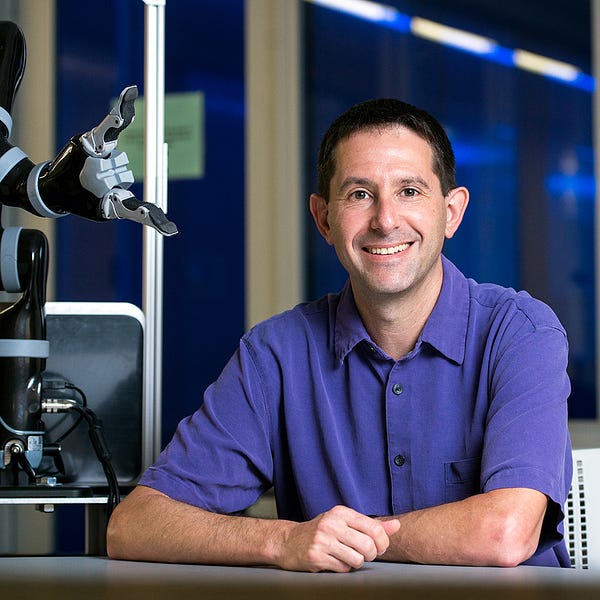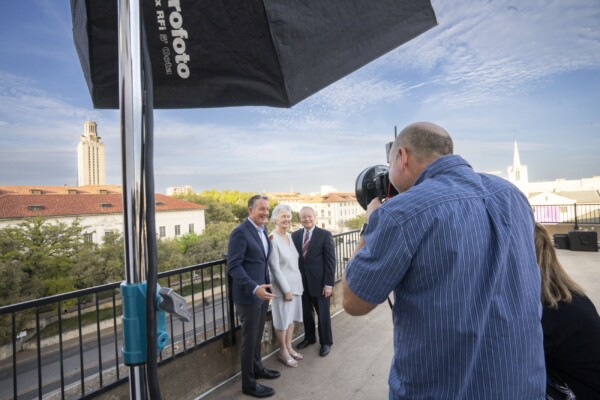Your Co-Workers are Computers
AI is changing how work gets done, with researchers forecasting both more efficiency and increased monitoring.
By Jeremy M. Simon

Artificial intelligence may soon streamline your workday.
Imagine being ferried to work by a driverless vehicle. Once there, you turn to your responsibilities with greater focus: Time-consuming cognitive tasks, such as reading and summarizing lengthy reports, are no longer part of your job, now handled by computer. Dangerous or dirty tasks have also been handed over to a robot. During a break, you stroll around the office and chat with coworkers. A tracking device measures where you’re going, who you’re talking to, and for how long, all in an effort to maximize productivity.
AI is expected to bring major changes to society, and the workplace is no exception.
“It’ll make it a little bit safer, a little bit more efficient, and a lot creepier,” says James Scott, associate professor of Information, Risk, and Operations Management at the McCombs School of Business and author of the book “AIQ: How People and Machines Are Smarter Together.”

Artificial intelligence gives machines human-like “thinking” abilities through the use of connected algorithms. Those abilities range from the performance of relatively simple cognitive tasks and decision-making to the potential of science fiction-like future possibilities of what computers can currently only do in the movies.
Scott and coauthor Nick Poulson say the current AI boom is due to the combination of faster computers, massive amounts of data, cloud computing, and good ideas. But now that AI is taking off — including at major companies like Amazon, Facebook, and Google — how worried do human workers need to be about replacement by machines? Scott and other artificial intelligence experts at The University of Texas at Austin aren’t sounding any immediate alarms. But they all agree that change is underway.
“There are opportunities for AI technology to pervade almost any type of job, but hopefully in a way that makes people more efficient and, in many cases, could increase job satisfaction,” says Peter Stone, a UT computer science professor, AI researcher, and member of the study panel for Stanford University’s “One Hundred Year Study on Artificial Intelligence”(or AI100).
Expect AI to shake up the employment market. But making predictions isn’t easy.
“People tend to focus a lot on jobs that could be eliminated. It’s more difficult to foresee which jobs would be created.” — Peter Stone
When AI is HR
Although AI may not replace you at work, it could help hire you: AI can easily compare the language used in job postings to the candidates who apply, Scott says. Companies can then adjust accordingly, crafting job descriptions that, for example, draw a more ethnically diverse pool of applicants.
Some changes are more intrusive for workers. Consider real-time monitoring: Startups like people analytics software provider Humanyze can now place GPS sensors, microphones, and Bluetooth trackers on workers to follow their movements and interactions. Using these tools, employers can learn about their workers’ teamwork and communication, such as how often employees listen versus talk. That information can lead to decisions about who is effective and deserving of a promotion (and who isn’t).
Research into workplace communication using AI is already underway. McCombs IROM Department researchers are studying sales representatives at a Chinese information technology services company who use a smartphone app to communicate with colleagues and supervisors. Professor Andrew Whinston, Assistant Professor Wen Wen, and Ph.D. candidate Haoyuan Liu are looking into how successful sales results shared in real time impact other workers’ productivity. Using text mining, researchers categorized the content of communications between employees, such as feelings of shame or expressions of encouragement related to their sales results.
While results haven’t yet been finalized, the researchers see evidence that salespeople who learn about the success of their colleagues work harder to find and contact new customers themselves.
Improving Safety
AI may also improve workplace safety, since human workers will no longer have to get close to dangerous machines. Should workers do something unsafe, AI performing real-time monitoring can notify supervisors.
Truck driving is one such risky profession. According to the Bureau of Labor Statistics, in 2012 truck drivers had a workplace fatality rate more then seven times higher than the overall workplace average. Machines are therefore expected to take over long-haul trucking, since experts say self-driving vehicles are much safer overall than human drivers.


However, human delivery people may still be needed, says Stone of the Computer Science Department. “An example people often give is a UPS deliverer,” he says. “Even if you have autonomous cars, there’s still the task of being able to get the package from the truck to the front doorstep.”

Helpful Robots in Service, Health Care
Still, it’s not only good news for workers. “It seems anyone whose job involves fairly straightforward decision procedures is at threat,” says Michael Tye, a UT philosophy professor and author of numerous books and publications on consciousness.
Consider service industry workers, such as staff at retailers or restaurants. AI might offer better customer service experiences. “I think that does threaten a lot of folks who are just barely getting by in today’s economy,” Scott says.
In restaurants, AI is already claiming some tasks from servers. During a visit to China, Tye found restaurant customers using the WeChat application connected to their bank accounts to order and then pay for meals with their phones. Humans were only needed to bring food to the table.
Even health care work could change. From a patient’s symptoms, doctors consider possible diseases, which are then narrowed down by asking questions. “It’s quite likely that AI systems will take over diagnoses of day-to-day issues in the medical field,” says Tye.
Creating Jobs
Maytal Saar-Tsechansky, a data scientist and associate professor of IROM, says the medical field is just one area that can benefit from machines and humans working together. Overall, she sees great potential from AI adoption over the longer-term.

“There’s a huge part of the world’s population that really have no access to the economic opportunities of people in the West,” she says. Through online labor platforms like Amazon’s Mechanical Turk, people in remote corners of the globe can find work, such as coding, for companies located far away.
Saar-Tsechansky is developing AI and machine learning technologies that will enable companies to vet these remote workers. “It makes a prediction about the quality of the work you’re going to get and a cost-effective payment to offer,” she says.
“That creates completely new opportunities,” she says. “People don’t have to pay a fortune to live in New York City or other large cities to have these job opportunities.”
History may provide a guide. The horse-drawn carriage was eventually replaced by the taxi, which in turn has largely been replaced by ridesharing companies. AI will also create increasingly efficient business models. Says Whinston: “There will always be jobs, but people will have to get educated for them, as we’ve seen through the history of the world.”


